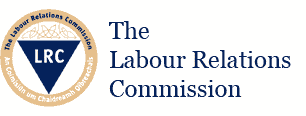More on Workplace Mediation
?Mediation is a voluntary, confidential process that allows two or more disputing parties to resolve their conflict in a mutually agreeable way with the help of a neutral third party, a mediator?
The Labour Relations Commission has general responsibility for promoting good industrial relations in Ireland. In this regard it provides a comprehensive range of industrial relations services including advice, conflict resolution (conciliation, facilitation and mediation) and conflict prevention. The provision of a Workplace Mediation Service is designed to provide an effective, tailored response to the issues arising in Irish workplaces today. The Workplace Mediation Service is delivered by skilled officers of the Commission?s Conciliation and Advisory Services
- What is the Workplace Mediation Service?
- How does Workplace Mediation work?
- What are the Benefits of Workplace Mediation?
- What Happens if my Dispute Remains Unresolved after Mediation?
- How do I Apply for Mediation?
- Will my application be treated confidentially?
What is the Workplace Mediation Service?
The Labour Relations Commission?s workplace mediation service provides a prompt, confidential and effective remedy to workplace conflicts, disputes and disagreements. Workplace mediation is particularly suited to disputes involving individuals or small groups of workers. Examples of such disputes would be:
- Interpersonal differences, conflicts, difficulties in working together
- Breakdown in a working relationship
- Issues arising from a grievance and disciplinary procedure (particularly before a matter becomes a disciplinary issue)
- Industrial Relations issues which have not been the subject of a referral to the Rights Commissioner Service or the Conciliation Service, the Labour Court or other statutory dispute resolution body.
How does Workplace Mediation work?
Mediation provides an opportunity for those involved to address the issues, explore options and reach a workable outcome through a mutually agreeable course of action. The process is flexible and can be adapted depending on individual situations but essentially revolves around giving every individual concerned an opportunity to give their side of the story and to work with the other party to find a solution. The process may involve a mix of joint meetings or meetings with the mediator alone. The entire process is focused on every individual involved being comfortable with the process and on the active exploration of potential solutions. Some key principles governing the process include: -
- It is voluntary ? it can only take place on the basis that all sides are agreeable to participate. Anyone can withdraw at any stage if they want to.
- It is confidential ? the process is private and confidential to the parties unless otherwise agreed. This will give parties confidence to express exactly how they feel and confidence to explore solutions without prejudice.
- It is fast ? takes place as soon as schedules etc permit.
- It is solution focused ? the object of the exercise is to reach a workable and mutually agreeable solution to the conflict or issue of difference.
- It is impartial ? the mediator is impartial and does not take sides.
What are the Benefits of Workplace Mediation?
- It is an opportunity to resolve a problem in an informal non-adversarial way.
- The resolution of the issue remains in the control of the individuals directly concerned. They will be involved in the development of the solution and as a result the outcome is likely to be better and longer lasting.
- It creates a safe place for all sides to have their say and be heard.
- It has the potential for a high success rate and positive outcomes where the parties are genuinely committed to a resolution.
Mediation focuses on the future working relationships of those involved. - It will not duplicate other dispute resolution services.
What happens if a dispute remains unresolved following mediation?
The mediation service of the Labour Relations Commission is focussed on assisting parties to deal effectively with issues that arise in the workplace. Participation in mediation does not oblige any party to commit to any further procedure in the event that the problem remains following mediation.
The mediator will, in the event of a problem remaining unresolved following mediation, assist the parties in agreeing a joint way forward in relation to the issues.
How do I Apply for Mediation?
All applications for mediation should ideally be made on a joint basis. The process will work best when both parties have a desire to resolve an issue and have jointly agreed that mediation is the best means to secure that resolution.
Notwithstanding this, the Commission will attempt to secure agreement to participate in mediation where only one party has sought the intervention. The process is however voluntary and the Commission is not in a position to compel attendance.
All applications for mediation should state clearly the name and contact details (including ?phone numbers) of both parties, the number of persons involved and the nature of the issue involved. Applications should be addressed to :
Workplace Mediation Service
Labour Relations Commission
Tom Johnson House
Haddington Road
Dublin 4.
Alternatively, you can email your application to mediation@lrc.ie
Will my application be treated confidentially?
Yes. The Labour Relations Commission commits to the confidential handling of any issues referred to it. The Commission will not publish details of any individual case or the identity of any applicant.
